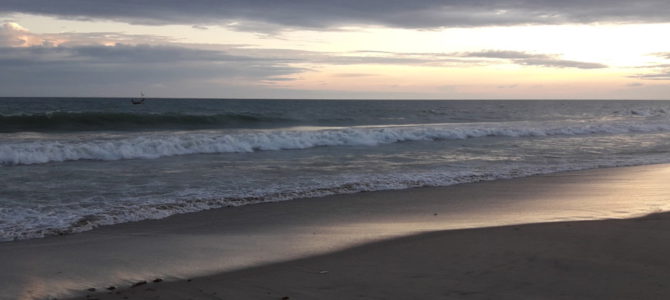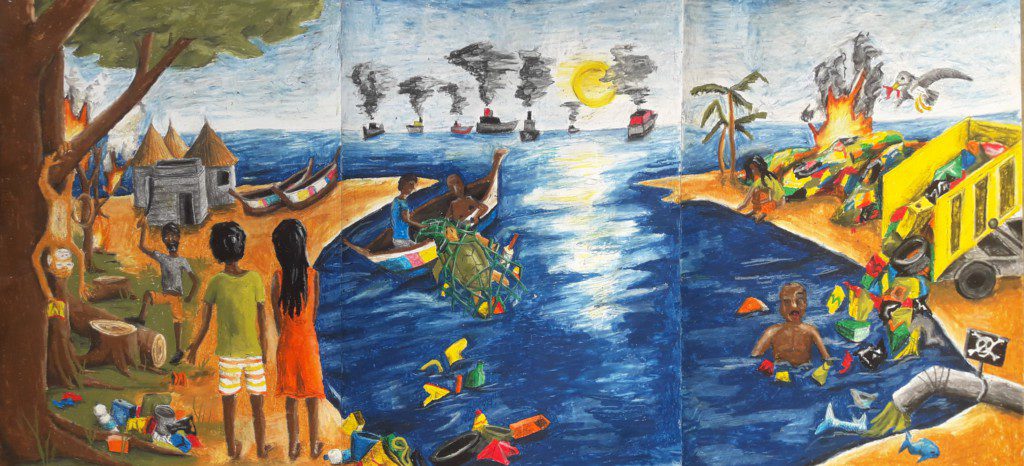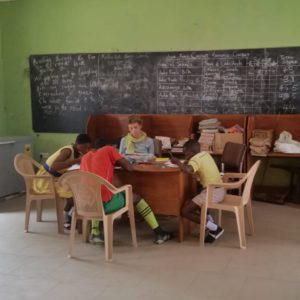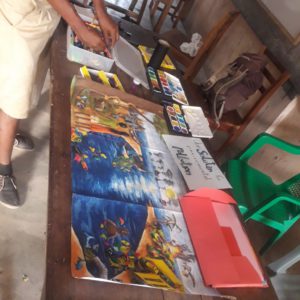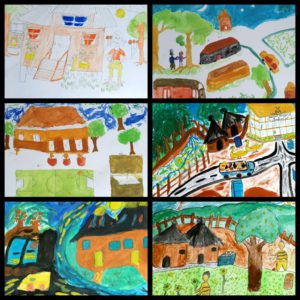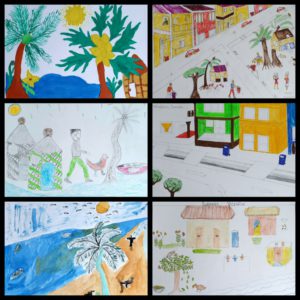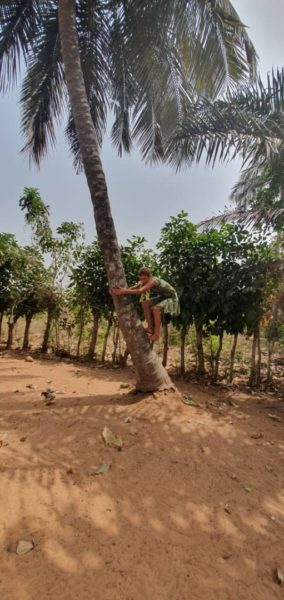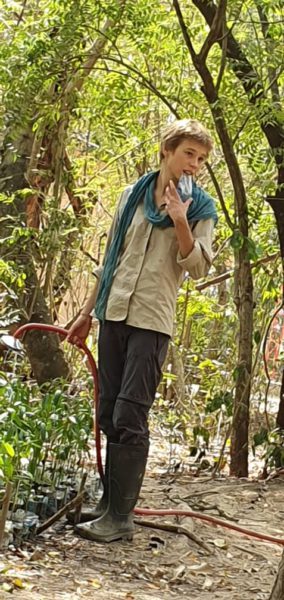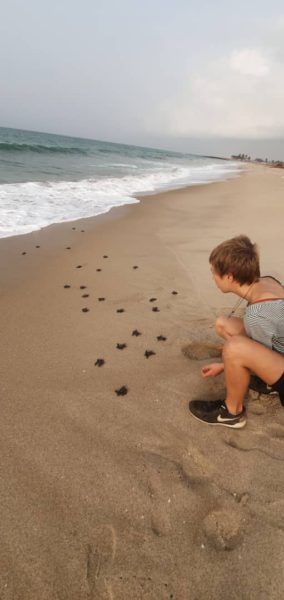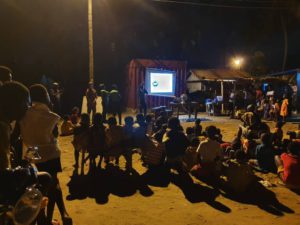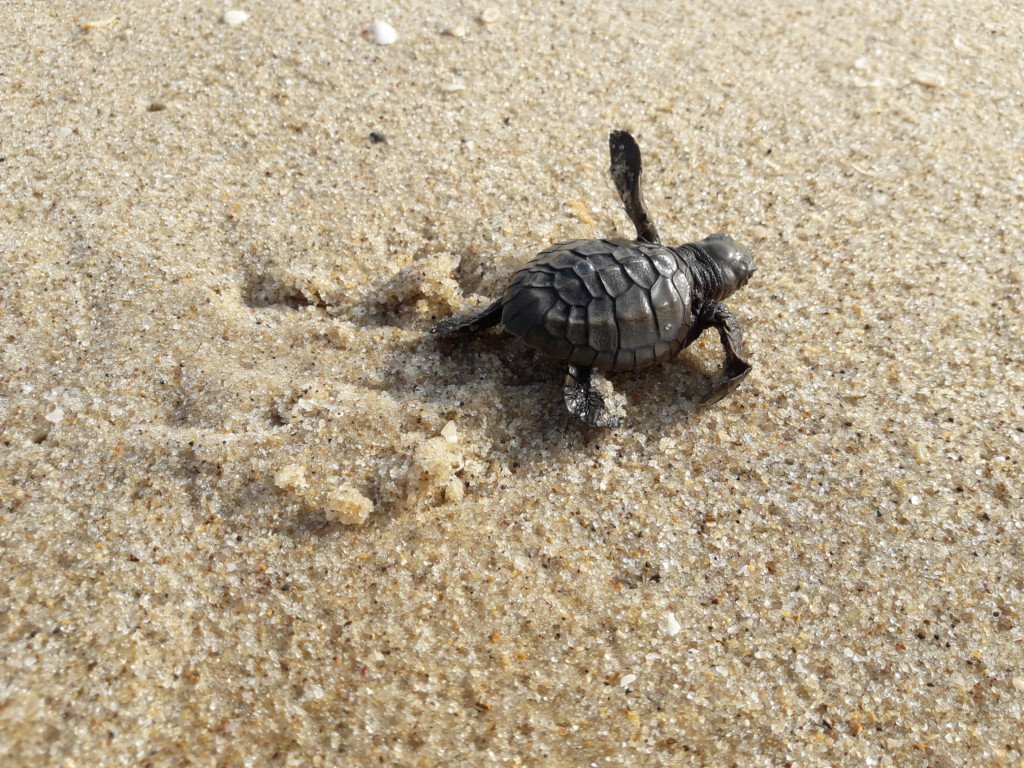Ich bewege mich in Überlichtgeschwindigkeit. Mir war schon zu Beginn des Freiwilligendienstes klar, dass gerade die letzten Wochen in Ghana schnell vergehen werden.
Aber wie kann es sein, dass gestern noch Weihnachten war und ab heute nur noch 18 Tage bis zu unserem Abflug?
So ist es immer mit Dingen, die mir Spaß machen und mich herausfordern. Zwar ist seit Silvester kaum etwas Neues passiert, außer einigen Ausflügen in die Hauptstadt Accra und einem Krankenhaus besuch in Ada (bin wieder 100% fit ;), aber gerade deswegen fließen die Tage ineinander.
Jedes Mal wenn ich nach einem Ausflug, einer Reise oder einfach nach der Arbeit mit dem rostigen Schlüssel versuche die Tür unserer Wohnung aufzubrechen und über die Schwelle trete, überkommt mich das das Gefühl nach Hause zu kommen. Und Ada Foah ist, ohne dass ich es wirklich gemerkt habe, mein zweites zu Hause geworden. Mit all den Menschen, dem klapprigen Rad, das ich zur Arbeit fahre, das Einkaufen bei unserer Gemüsefrau, Derek hinter seinem Obststand, die Straße zum Meer, laufen durch die Fischerdörfer, im Trotro einschlafen… Alles greift ineinander, wie Zahnräder in einem Uhrwerk. Alles Alltag! Ach wie sehr werde ich es vermissen!
Letzte Woche haben wir endlich den ersehnten Kunstwettbewerb in den Partnerschulen durchgeführt. Schon zuvor haben wir alle Schulleiter getroffen und sie zu den Umweltprojekten in ihren jeweiligen Schulen befragt. Einige haben Baumpflanzungen durchgeführt oder versuchen Mülltrennung einzuführen. Anschließend haben wir sie über unseren Wettbewerb informiert.
Unter dem Slogan „Our solution for environmental pollution“ sollten die Schüler ein Bild mit Lösung zu Umweltproblemen malen. Wie sieht die perfekte Umwelt aus? Was wünscht du dir für die Natur? Gibt es umweltfreundliche Alternativen?
Leider durften aus den fünf Schulen der Umgebung jeweils nur drei bis sechs Kinder unterschiedlicher Klassenstufen teilnehmen. Auch waren einige der Schüler wegen uns Europäern, der Aufgabenstellung, unserer Sprache oder allem drei sehr eingeschüchtert.
Ich bin zwar nicht oft in einer ghanaischen Schule gewesen, aber durch Erzählung von Freiwilligen, Lehrern, und Schülern habe ich erfahren, dass sich das Bildungssystem doch sehr von dem deutschen unterscheidet. In Ghana gilt die Schulpflicht. Oft beginnt der Unterricht schon früh morgens mit dem Singen der Nationalhymne oder der Reinigung des Schulhofes und geht bis zum späten Nachmittag. Sportunterricht findet auf Grund der Temperatur Vormittags statt. Es gibt oft Frontalunterricht, Lehrermangel und auch Stockhiebe als Bestrafungsmaßnahmen sind Normalität.
Und wahrscheinlich gehört ein Kunstwettbewerb mit einem so freien Interpretationsspielraum nicht zum Alltagsprogramm und kann durchaus Grund für Verwirrung liefern. Aber auch wenn es etwas stockend angefangen hat, war die Atmosphäre in den Klassen jedes Mal etwas entspannter und lockerer.
Zunächst haben wir uns zusammen den Film „ Sources and impacts of Marine litter“ aus dem Projekt Marlisco angesehen, den ich letztes Jahr während meines FÖJs bei der EUCC-D E (Coastal and Marine Union) auch Schulklassen gezeigt habe. Anschließend haben wir anhand eines selbstgezeichneten Negativbeispiel- Bildes weitere Umweltprobleme diskutiert, mit denen die Schüler selbst in ihrem Alltag konfrontiert sind. Dann sind die Schüler kreativ geworden und mit den Kunstmaterialien aus dem deutschen Päckchen sind innerhalb von zwei Stunden richtige Kunstwerke entstanden.Wenn wir mit allen Schulen durch sind, werden wir das Gewinnerbild durch Abstimmung der Schüler ermitteln. Ich hoffe dann haben noch mehr Kinder die Möglichkeit, sich mit dem Thema auseinanderzusetzen. Zudem würde ich gerne Plakate mit den Bildern drucken, um sie den teilnehmenden Schulen auf der Siegerehrung zu geben und im Schulgebäude aufzuhängen.
Und nun strebt alles dem Ende zu. Die letzten Wochen war ich noch öfters in Accra, habe eine Fahrradtour zu Wasserfällen bei Aburi gemacht, war dort in den Botanischen Gärten aus Kolonialzeiten spazieren, im Uni Schwimmbad schwimmen, habe in den Bars der Oxford Street viele nette Leute kennengelernt, in einem dreistündigen Gottesdienst getanzt und war zum ersten Mal Wellensurfen.
Es gibt aber auch Momente, in denen ich mich auf zu Hause freue. Auf Familie und Freunde, Schwimmen und Schimmelkäse, Pullis und Regenspaziergänge mit Hund. Aber für den Moment geht es daran die letzten verbleibenden Ghana-Wochen noch einmal richtig zu genießen.
(Zum Ende meines Freiwilligendienstes ist auch der final Report für die UNESCO in Ghana fällig und ich habe schon mal etwas vorgeschrieben, da eine Freundin mich in den letzten zwei Wochen besuchen wird. Viel Neues ist nicht dabei, aber alle guten Dinge sind drei. Der Vollständigkeit halber habe ich den Report wieder mit angefügt.)
Report on the Voluntary service in Sogor Ramsar Site No.3
by Ronja Trübger (16/09/19-22/02/20)
Talks and activities at work
Planting trees: We stored mangrove seedlings on a pick up and planted them in the lagoon together with residents of the community from Tobloku. Furthermore, we planted fast growing trees next to the village, so that the communities will be able to use them for firewood instead of the mangroves.
Raising mangrove seedlings: The Wildlife Commission continued to fill water sachets (21.000) with soil for planting seedlings. (Acacia mangium). We collected ripe seeds in the wetlands and peeled them before planting. Afterwards we planted mangrove seedlings in the plastic sachets. Furthermore, we took care of the one-year mangrove seedlings by watering them. We cleaned the area from litter and removed old leaves, sticks and weed.
Turtle monitoring: I took part in the weekly beach patrol at a beach quad, in which we counted and documented the turtle tracks, nests and the death individuals of three different marine turtles (olive ridley sea turtle, leatherback sea turtle, pacific green sea turtle). I saw many tracks of adult turtles, tracks of hatched baby turtles, intact nests and nests which have been destroyed by stray dogs.
Turtle hatchery: Whenever we saw a nest of a turtle, which was too close to the sea so that the survival of the eggs was in danger, the Wildlife Division removed them and brought them to the hatchery. During our stay, we buried two nests of an olive ridley turtle (102 eggs; 98 eggs) and one nest of a leatherback turtle (65 eggs) in the hatchery. After the turtle babies hatched, we released them into the sea.
Turtle rescue: Because of light irritation from human settlement or unspecified wind directions, the nesting marine turtles sometimes lose their orientation and after their egg deposition they creep in the wrong direction. When lost turtles are found by community members, these can call the Wildlife Division to rescue the turtles. During the last months I helped to pull tree leatherback marine turtles back into the ocean.
River cleaning: Since the beginning of September the river bank next to the office has been cleaned by the Wildlife Division together with the community Obane downstream. All trees, reeds and algae at the riverside have been cut down and removed to improve the river flow into the Songor lagoon, which is too dry and salty because of the salt extraction. The project ended in December and the community members are supposed to continue on their own.
Ecotourism services: I took part in the turtle night walk several times. We searched for nesting turtles and tracks together with the tourists. Additionally, we cruised with a boat on the Volta River, to show estuary and creeks and explain our work with mangroves and wildlife.
Education: Sometimes on Fridays, we went to the associated schools of the Biosphere Reserve for an education program. The Wildlife Division taught the students in nature protection, environmental conservation and human rights. Therefor we prepared a short theatre scene about littering and the correct waste management. In addition to this we gave talks on the education programme in the communities during the evening time to give the residents the possibility to inform themselves and ask questions.
Art competition in schools: The other Volunteers and I went to the associated schools of the Biosphere Reserve to talk with the headmasters, teachers and prefects about their environmental programmes and challenges they realised in the schools. Afterwards we organised the Art Competition: “Our solution for environmental pollution!”, in which students from every class of four associated schools took part. The 22 participants could show their own ideas and wishes for nature protection in a creative way. The winners were elected by the students themselves, so that everyone had the opportunity to be part of the competition.
Restauration of signs: I helped to build up two new painted signs next to the main road, which inform passing cars about the UNESCO Biospere Reserve and the nature protection area.
Meetings with the Community: I took part in several meetings between the Biosphere Reserve and different stakeholders like the Legon University of Ghana, the EPA (Environmental Protection Agency), the FAO (Food and Agriculture Organisation of the united nations), the local radio (radio Ada) and the communities of west and east Ada. In this meetings and interviews the main topics were challenges of landscape use, nature protection and environmental problems (like overfishing, erosion, climate change, and plastic pollution).
The reasons for the meetings were inter alia a research project about sustainable ways of using resources in the Songor Biosphere Reserve considering the climate change, the election of a board, which will represent all communities and the planning of a radio show series about the particularities and challenges in each community.
Private
After our arrival in Accra in September we went to the National Commission for the UNESCO in Ghana and learned much about the structure and responsibilities of a Biosphere Reserve.
Afterwards the UNESCO sent me to Ada Foah, where a house is provided for the UNESCO Volunteers. My neighbours are also my colleagues at the Wildlife Division and during the first days they introduced me to the other staff members and helped me a lot with the orientation in Ada and the surrounding arrea.
From the beginning on I felt really comfortable in Ada Foah and previous challenges have become part of my daily life quickly. Annika, the volunteer from the Bia Biosphere Reserve, switched her hosting site to our place at the end of October, so we were three volunteers in Ada than and we lived, worked and travelled together. Moreover we expanded the equipment of our apartment, also for following generations of volunteers.
During the 6 Months we got to know our neighbours, neighbour kids and colleagues intimately. I am now familiar with many habits, the local food, traditions and celebrations. Furthermore, I continued my Dangme lessons until the end of our voluntary service, because it was really helpful to interact with the local people in Ada and surrounding.
In my free time I enjoyed meeting friends, going to the beach and playing or doing handcrafts with our neighbours‘ children. During our holidays and weekends we were travelling a lot. In the National Parks like Shai Hills or Mole park we had the opportunity to explore the different landscapes, animal species and plants of the Ghanaian country. Moreover I realised the differences between the village and city life by visiting Accra, Tamale or Cape Coast. On our journey through Ghana I experienced the individuality of each place in culture, language and outer appearance.
Challenges and Solutions
Because the park manager changed in December, there was no park manager in the office for a long time. Therefore, the Wildlife Division had to work mostly self-sufficient and sometimes there were internal communication problems and several misunderstandings between all employees. Because of this it was difficult to understand the expectations of the staff and our working tasks at first. But finally we were included in nearly every part of the work inside the Biosphere Reserve and got used to our working tasks.
I think it would have been helpful to have a general introduction in the first week of the voluntary service.
For me as a female volunteer it is often hard to accept that women are still discriminated and deprived in some ways. The fellow workers were always respectful, but sometimes I was treated differently and it was more difficult for me to give my opinion. Lukas the male volunteer was the one, who was going to be informed about changings in working tasks or organization.
I also had a disagreement about the mangrove planting, because the seedlings are still planted together with a plastic sachet into the ground. We could not find a solution so far and the planting of plastic sachets will be continued. In my personal opinion the Biosphere Reserve has to think about its own ecological footprint and try to find environmentally friendly alternatives to be a role model for the communities.
During the staff meetings I had the opportunity to give my opinion and make new suggestions. Despite this the implementation was often difficult, but we always could clarify all arguments.
Conclusion
All in all I am really glad to had the opportunity to spend 6 months in the Songor Ramsar Site and UNESCO Biosphere Reserve. It was an adventurous time full of challenges, difficulties and joyful events.
I experienced a daily life, which was totally different from my life in Germany in many ways. Despite this I felt homelike soon because residents and colleges tried to show and explain me their traditions, their point of view and the challenges of everyday life, e.g. preparing local food. During my stay I learned much about the culture, language and history of Ghana.
Moreover I got to know the working tasks and the importance of a Biosphere Reserve and nature protection, environmental education and conservation in Ghana. I also learned a lot during the practical work outdoors and was able to gain new experiences while monitoring turtles or planting mangroves.
Thank you so much for the chance you gave me 6 Months ago. I will never forget my time in Ghana and I look forward to coming back some day.
